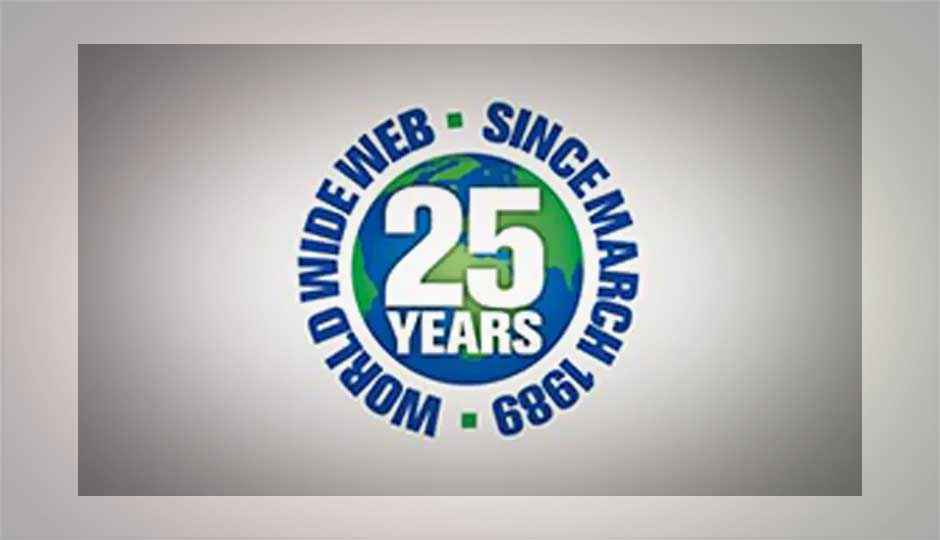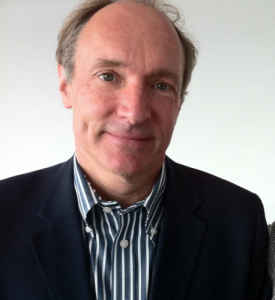The World Wide Web turns 25

25 years ago, Tim Berners-Lee's idea of a connection between computers completely changed the way the world communicates today. We take a look at the World Wide Web’s history, and its future.
The World Wide Web turned 25 years old today. Sir Tim Berners-Lee, a British computer scientist, proposed the idea for an information management system on March 12, 1989. At the time, Berners-Lee was a computer scientist at CERN in Switzerland. Currently, he is the director of the World Wide Web Consortium which oversees the Web’s continued development.The World Wide Web (WWW) is a system of interlinked hypertext documents (which are read by browsers only) accessed via the Internet. The first web page was created by Berners-Lee himself. He wanted to design the Web as a system through which scientific groups could share data in a secure manner.
Sir Tim Berners-Lee, the creator of World Wide Web
Berners-Lee wrote a paper titled “Information Management: A Proposal” in which he stated that “the hope would be to allow a pool of information to develop which could grow and evolve with the organisation and the projects it describes.” His boss, Mike Sendall, wasn’t intrigued by his proposal and wrote “vague but exciting” on the cover. But this did not deter Berners-Lee. He went on to write the HyperText Transfer Protocol (HTTP), HyperText Markup Language (HTML) and the first ever browser, WorldWideWeb. In 1990, he coined the term “World Wide Web.” Until then the web was called “Mesh.” In 1993, CERN allowed the technology invented by Berners-Lee to be used freely by everyone and within a few years, millions of people worldwide got hooked to it.
Currently, there are more than 600 million websites in the world, making accessing information as easy as a click on the mouse. Since its inception, WWW has grown exponentially and is now the biggest information resource in the world.
According to Berners-Lee, today is an “important milestone” and he hopes this anniversary “will spark a global conversation about our need to defend principles that have made the Web successful, and to unlock the Web’s untapped potential.”
Three out of five people worldwide still do not have access to the Web, but Berners-Lee hopes things will change. “I believe we can build a Web that truly is for everyone: one that is accessible to all, from any device, and one that empowers all of us to achieve our dignity, rights and potential as humans.” he says.
He believes an online “Magna Carta” is needed to protect and enshrine the independence of the medium he created and the rights of its users worldwide, especially since the web is under constant attack from governments and corporates. He says new rules are needed to protect the “open, neutral” system.
Berners-Lee says “Our rights are being infringed more and more on every side, and the danger is that we get used to it. So I want to use the 25th anniversary for us all to do that, to take the web back into our own hands and define the web we want for the next 25 years,” while calling for a bill of rights for the Web. Berners-Lee believes lawyers and politicians need to understand programming in order to understand what can be done with a computer. He also spoke against US control of the dominant database of all domain names and says the US can’t be above others in the running of something which transcends borders.
The Future
The Pew Research Center came out with a report to mark the 25th anniversary of the World Wide Web. Researchers predict the Internet will become ‘like electricity’ — less visible, yet deeply embedded in people’s lives for good and ill. The report says to a notable extent, analysts agree on the technology change that lies ahead, even as they disagree about its ramifications.
The researchers believe:
- A global, immersive, invisible, ambient networked computing environment built through the continued proliferation of smart sensors, cameras, software, databases, and massive data centers in a world-spanning information fabric known as the Internet of Things.
- “Augmented reality” enhancements to the real-world input that people perceive through the use of portable/wearable/implantable technologies.
- Disruption of business models established in the 20th century (most notably impacting finance, entertainment, publishers of all sorts, and education).
- Tagging, databasing, and intelligent analytical mapping of the physical and social realms.
Regarding the future of the digital network, the researchers are hopeful that:
- Information sharing over the Internet will be so effortlessly interwoven into daily life that it will become invisible, flowing like electricity, often through machine intermediaries.
- The spread of the Internet will enhance global connectivity that fosters more planetary relationships and less ignorance.
- The Internet of Things, artificial intelligence, and big data will make people more aware of their world and their own behavior.
- Augmented reality and wearable devices will be implemented to monitor and give quick feedback on daily life, especially tied to personal health.
- Political awareness and action will be facilitated and more peaceful change and public uprisings like the Arab Spring will emerge.
- The Internet will become ‘the Internets’ as access, systems, and principles are renegotiated.
- An Internet-enabled revolution in education will spread more opportunities, with less money spent on real estate and teachers.
At the same time, the researchers fear consequences including:
- Dangerous divides between haves and have-nots may expand, resulting in resentment and possible violence.
- Abuses and abusers will ‘evolve and scale.’ Human nature isn’t changing; there’s laziness, bullying, stalking, stupidity, pornography, dirty tricks, crime, and those who practice them have new capacity to make life miserable for others.
- Pressured by these changes, governments and corporations will try to assert power — and at times succeed — as they invoke security and cultural norms.
- People will continue — sometimes grudgingly — to make tradeoffs favoring convenience and perceived immediate gains over privacy; and privacy will be something only the upscale will enjoy.
- Humans and their current organizations may not respond quickly enough to challenges presented by complex networks.
- Most people are not noticing the profound changes today’s communications networks are already bringing about; these networks will be even more disruptive in the future.
The Pew Research Center concludes foresight and accurate predictions can make a difference; and that the best way to predict the future– is to invent it.

